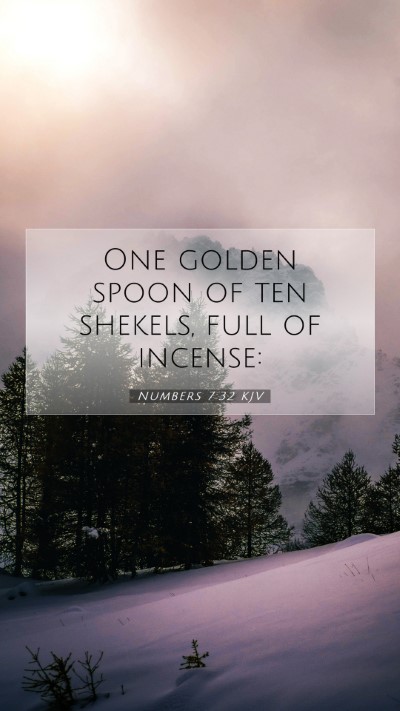Bible Verse Meaning of Numbers 7:32
Verse: Numbers 7:32 - "And on the sixth day, Eliasaph the son of Deuel, prince of the children of Gad, offered." (KJV)
This verse is part of a larger narrative in the book of Numbers, where the offerings of the leaders of the twelve tribes of Israel are detailed as they dedicate gifts for the service of the tabernacle. This particular offering represents the tribe of Gad.
Summary of Insights from Public Domain Commentaries
The interpretations of this verse provide a rich understanding of its implications in the context of the Israelite community and their relationship with God. Below are combined insights from notable commentaries:
-
Matthew Henry's Commentary:
Henry emphasizes the significance of the order and the importance of leadership in worship. The specific mention of Eliasaph, the son of Deuel, illustrates how the leaders of the tribes were to engage actively in worshiping God through offerings. By noting the details, it reminds the readers of the importance of their roles within the community and God’s covenant with Israel.
-
Albert Barnes' Notes:
Barnes discusses the systematic approach to these offerings and highlights that each tribe’s leader presents their offerings in a deliberate sequence, which reflects order in worship. The act of giving by the tribe of Gad on the sixth day symbolizes their commitment and willingness to contribute to the collective spiritual life of Israel, reinforcing the principle of unity in worship.
-
Adam Clarke's Commentary:
Clarke focuses on the historical context of Eliasaph’s offering, explaining how it contributes to the overall narrative of the Israelites' journey. He elucidates that numbers are not merely data; rather, they signify communal identity and the distinct roles each tribe played. The recognition of this act of devotion underscores the significance of sacrifice and service in the community.
Understanding Scripture through Numbers 7:32
The offering by Eliasaph can be seen as an embodiment of leadership, sacrifice, and community participation in the life of faith. It demonstrates how each tribe’s contribution plays a vital role in worshiping God and maintaining unity among the Israelites.
Significance of Numbers 7:32
This verse showcases several critical themes relevant for understanding Scripture:
- Leadership: The role of leaders in the spiritual lives of their communities is pivotal. Eliasaph’s act exemplifies how leaders should guide by example, encouraging devotion and commitment.
- Unity: The collective participation in offerings signifies a united front in worship, which is crucial for communal identity.
- Obedience: The Israelites were commanded to present offerings, and this act of Eliasaph serves as an example of adherence to God’s instructions.
Bible Study Insights
For those engaging with the text during Bible study groups or online Bible study, Numbers 7:32 serves as a powerful example of how individuals can contribute to the collective faith journey. Here are some topics for deeper exploration:
- How do individual contributions reflect on the communal worship experience?
- What does this verse teach about the nature of leadership in faith communities?
- In what ways can we apply the themes of sacrifice and obedience in our daily lives?
Cross References
For a more enriched understanding, you may consider the following related verses:
- Exodus 30:15 - Discusses the required offerings from each tribe.
- 1 Chronicles 29:17 - Reflects on the willingness of leaders to contribute.
- Hebrews 13:16 - Teaches on the importance of doing good and sharing with others.
Conclusion
In interpreting Numbers 7:32, we gather that each offering was significant and represented much more than mere ritual—these acts embody faith, leadership, and community. Through proper understanding and the application of such Scriptures, readers can enjoy a deeper relationship with God and insight into the framework of their faith communities. This study encourages individuals to reflect on their contributions to their spiritual communities and the importance of unity in worship.


